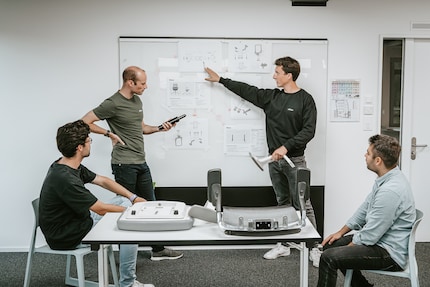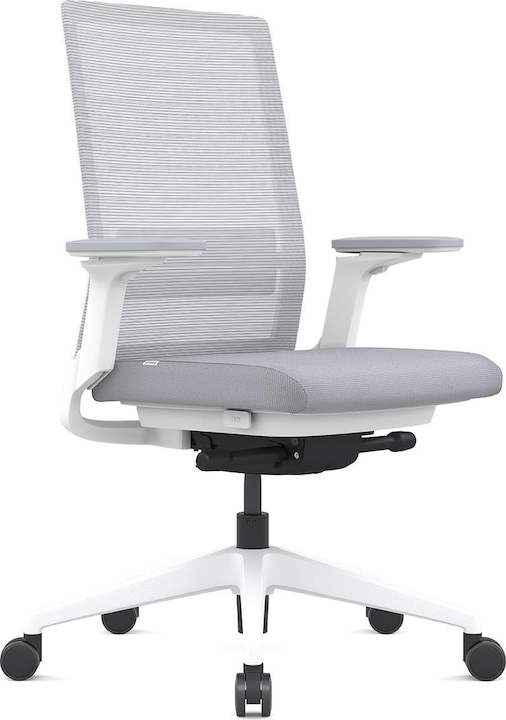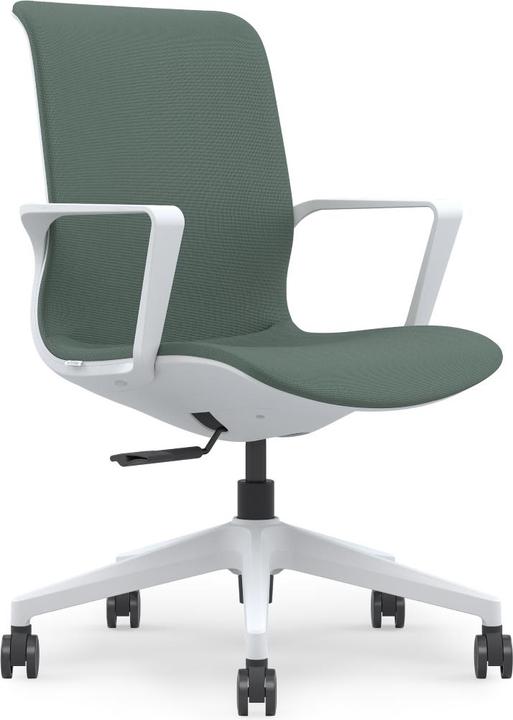

Behind the scenes: What makes Ofinto different from the competition
Christian Stiefel, one of the two founders of the office furniture brand Ofinto, reveals in an interview how the office chair models are created and produced. Ultimately, the difference between premium manufacturers and Ofinto does not necessarily lie in the product itself.
I recently presented the "Cloud" from Ofinto in a test report. In the comments, there was one user who googled that the chair was also available from a Chinese supplier for significantly less money. The implicit accusation: Ofinto's chair is too expensive for Swiss customers.
To get to the bottom of the matter, I meet Christian Stiefel in the Ofinto showroom in Zurich. The picture above shows him next to Jonas Romer, with whom he founded Ofinto. In conversation, I confront Christian with the accusation from the Galaxus Community. He explains the production process to me. "We work with partners all over the world - from Italian fabrics to plastic parts from China." Ofinto does not manufacture itself, but develops and produces together with experienced partners, many of whom are based in Asia. Why there and not in Europe? "Complete chair production in Europe is hardly feasible today," explains Christian. China has built up expertise in many areas, not just office chairs, which is difficult to recapture.
Manufacturing in Asia does not distinguish Ofinto from other premium manufacturers. These often do not operate their own factories either, but have models built from individual parts. This starts with gas pressure springs, continues with fabrics, upholstery and armrests and ends with the mechanical parts that allow you to rock the chair and adjust the height. All parts are available in different quality levels, depending on the brand. You can meet them at major trade fairs such as Orgatec in Cologne.
An important manufacturer is the Italian company Donati, for example. It supplies interested brands with individual components or even offers completely assembled office chairs, so-called design-ready products. Some of these chairs come from a Donati production facility in Guangdong, China. The Italian company publicises this fact in its sustainability report.
High production costs are shared
Ofinto does not source a "design-ready product" from Donati, but has its own manufacturing partner. The team in Switzerland has defined for the "Cloud" what the model should be able to do and how it should look
For the design of an office chair, there are about a handful of offices in the industry whose names are then frequently encountered, sometimes with different manufacturers. Peter Horn's design studio is responsible for the shapes of the "Cloud". When a designer comes up with a mould, it has to be produced. This requires injection moulds, for example, which cost tens of thousands of US dollars to develop and manufacture.
"We can't cover these costs on our own," explains Christian. That's why we have an agreement with the manufacturer. He produces the chair in larger quantities for the global market. That way, the price can be kept low. Ofinto has the exclusive distribution rights for the domestic markets. This means that the chair is also available in other regions of the world - at least in this form. You can find it on the relevant online marketplaces with relatively little effort.
You could try to order the chair. And if it were to make it to you - presumably at horrendous shipping costs - you could get an idea of which components were used. It could be that cheaper components were used than for Ofinto. "With the gas spring, the fabrics, the armrests - you can always save a few dollars," says Christian. The quality can therefore vary depending on which country it is made for. The principle is also widespread among car manufacturers. For example, a VW Passat in Germany looks different to one that is sold in the USA.
Ofinto focuses on high-quality materials, good ergonomics, sustainability and components that are otherwise only found in more expensive chairs from competitors. Ofinto is so sure of its products that it offers a ten-year guarantee on its chairs. "To achieve this, we invest heavily in quality assurance," emphasises Christian. "Our products undergo rigorous testing and fulfil international standards such as TÜV, BIFMA and Greenguard Gold."

Source: Ofinto AG
Only a few independent manufacturers left
Collaboration with suppliers and manufacturing partners is absolutely common in the industry. However, the larger a brand is, the stronger its position vis-à-vis suppliers. Take MillerKnoll, for example, a US company with an annual turnover of four billion US dollars and over 10,000 employees. Among other things, the group builds Herman Miller brand chairs such as the Aeron. However, even this company states that its products do not come from its own factories.
The Company's products (...) are manufactured primarily by controlled subsidiaries in the United States, the United Kingdom, Italy, China, Brazil, Mexico and India. A portion of the Company's products sold internationally are also manufactured by third-party suppliers.
Compared to the global giants, Ofinto is a young, agile company. The small team in Zurich focuses on what Christian describes as "essential": first-class service and efficient processes. The concept is also winning over more and more major customers. "We are focussing on the customer experience here," says Christian. The right office equipment should be easy to find, ordering should be simple and delivery should be fast. And all at a good price. This is achieved through an efficient supply chain and the elimination of middlemen with corresponding margins. "We also rely on efficient, digital marketing instead of costly traditional advertising channels," says Christian.
The situation is similar for private customers and SMEs: they come to Ofinto to furnish their workplace or an office, but don't trust the quality of the Swedish furniture giant and don't want to spend a fortune on Vitra and Co.
Own invention for a return
The established competition could learn a thing or two from the Ofinto team. Christian shows me two heavy metal rings that you could use to detach the gas strut from the star base. This is in case a customer wants to return a chair. Individual parts can be sent by post. Other companies would have to use a haulage company for this.
But actually, says Christian after a moment's thought, the part is used far too rarely. "The return rate is in the low single-digit percentage range," he explains. "That shows us that our customers are convinced of the quality." And the few chairs that are returned are refurbished by Ofinto and sold as renew models. "They are usually sold the moment they go online," says Christian.
Journalist since 1997. Stopovers in Franconia (or the Franken region), Lake Constance, Obwalden, Nidwalden and Zurich. Father since 2014. Expert in editorial organisation and motivation. Focus on sustainability, home office tools, beautiful things for the home, creative toys and sports equipment.
Interesting facts about products, behind-the-scenes looks at manufacturers and deep-dives on interesting people.
Show allThese articles might also interest you

Background information
«Buy once, buy well»: how Black+Blum develops products for life
by Anna Sandner

Product test
Ofinto Active office chair: high-end features at a mid-range price
by Martin Jungfer

Background information
Design made in Switzerland: 5 iconic Swiss products that play with the colour red
by Pia Seidel

